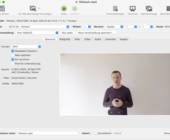News
05.03.2019, 13:06 Uhr
Projekt Zero: Google veröffentlicht Schwachstelle in macOS
Project Zero hat eine Schwachstelle in macOS entdeckt und nach einer Frist von 90 Tagen veröffentlicht. Die Sicherheitslücke wird als schwerwiegend eingestuft.
Sicherheitsforscher von Googles Project Zero haben eine Sicherheitslücke in Apples Betriebssystem macOS entdeckt. Google stuft den Bug als schwerwiegend (high severity) ein.
Apple wurde im November 2018 durch Google über das bislang unbekannte Sicherheitsproblem informiert, wie «ZDNet» berichtet. Nun ist die dabei standardmässig gesetzte Frist von 90 Tagen verstrichen und die Google-Forscher haben die Details veröffentlicht. Apple hat bereits eine Problembehebung in einer künftigen Version angekündigt, aber keinen Termin genannt.
Offenbar könnten Angreifer Zugriff auf die Daten des Nutzers bekommen, ohne dass dieser es bemerkt. Dazu wird anscheinend eine Lücke in der Verwaltung der Dateisysteme (XNU-Schnittstelle) ausgenutzt. «Wenn ein Angreifer eine Datei auf der Festplatte mutieren kann, ohne die Benutzer zu informieren, ist dies ein Sicherheitsfehler», heisst es im Monorail-Beitrag.
Das ist der (englische) Text auf Monorail:
«XNU has various interfaces that permit creating copy-on-write copies of data between processes, including out-of-line message descriptors in mach messages.
It is important that the copied memory is protected against later modifications by the source process; otherwise, the source process might be able to exploit double-reads in the destination process.
This copy-on-write behavior works not only with anonymous memory, but also with file mappings. This means that, after the destination process has started reading from the transferred memory area, memory pressure can cause the pages holding the transferred memory to be evicted from the page cache. Later, when the evicted pages are needed again, they can be reloaded from the backing filesystem.
This means that if an attacker can mutate an on-disk file without informing the virtual management subsystem, this is a security bug.
MacOS permits normal users to mount filesystem images. When a mounted filesystem image is mutated directly (e.g. by calling pwrite() on the filesystem image), this information is not propagated into the mounted filesystem.»
Kommentare
Es sind keine Kommentare vorhanden.






